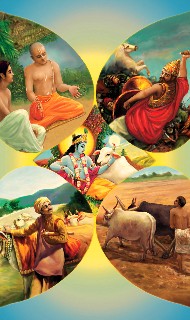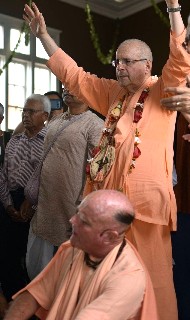The post Daily Darshan: June 22,2018 appeared first on Mayapur.com.
Websites from the ISKCON Universe
The post Daily Darshan: June 22,2018 appeared first on Mayapur.com.

His Grace Yamaraja Dasa ACBSP left this world.
Caturatma das: I have been asked to inform the Vaishnava community of the sad n...

Sri Ganga-puja, also known as Sri Ganga-dushara (she who removes inauspiciousness), appears in the month of Jyestha (May/June) on the 10th day of Sukla-paksa, or the waxing fortnight of the full moon. On this day, Maharaja Bhagiratha’s desire of bringing Ganga to this mortal world was finally fulfilled as the sacred river descended from Lord Siva’s blessed head at Mount Kailasa. The River Ganga then flowed through the Himalayas behind Maharaja Bhagiratha’s chariot and entered Jahnu Rsi’s asrama. Afterward, he successfully let the Ganga to Rasatala, in the lower planetary system, to liberate the sixty thousand sons of King Sagara.
To read the complete article please click here: https://goo.gl/EGM9yw

Srila Baladeva Vidyabhusana - Disappearance.
Sri Baladeva Vidyabhusana (Sri Govinda Dasa) appeared in the 1600’s near Remuna, Orissa. In his youth, he mastered Sanskrit grammar, poetry, and logic. After carefully studying the commentaries of Sankara and Madhva he took initiation in the Tattva-Vadi disciplic succession of Sripad Madhvacarya. Baladeva Vidyabhusana became a dig Vijaya Pandit (conqueror of all opponents) and began visiting the holy places. Wherever he went he defeated the local sages, scholars, and sannyasis.
The exact time and place of Sri Baladeva Vidyabhushana’s birth are unknown. Perhaps one day historians will be able to establish these facts beyond any doubt. From the little information that we do have about his life, we can conjecture that he was born in the 17th century of the modern era. Though we do not know the name of the exact village where he took birth, it was likely in the Balesore (Baleshvara) district of Orissa, somewhere near Remuna. From the date given in his commentary on Rupa Goswami’s Stavamala, it is clear that Baladeva was still living after the Battle of Plassey in 1757.
Read more: https://goo.gl/9DmxYE

Wisdom from the Bhakti Tradition in NY: (Album with videos and photos)
André Brown: Last night Radhanath Swami gave an amazing talk about Yamunacharya & Rama Mishra. He quoted a lot of verses, but this one in particular stuck out to me:

Srimati Gangamata Gosvamini Appearance by Sivarama Swami (12 min. audio)
From her childhood Princess Sachi devi, the daughter of King Naresh Narayana of Bengal, showed unalloyed devotion to Lord Sri Krishna. She even refused to marry on account of her genuine attachment to Krishna. After her father’s demise she ruled the kingdom. But she soon renounced it to find a bona fide spiritual master.
 By Prahlada-Nrsmha Das
By Prahlada-Nrsmha Das Once Online Vedabase is developed enough to be considered as perfect research tool I would like to launch other projects whose purpose will be Online Education. We would like to offer multiple online spiritual courses for all levels of spiritual progress. From introductory course up to Bhakti-vaibhava level. Courses will be available for free for everybody and each student will be able to follow it in his own pace. Each topics will be covered in separate video(s) and between them will be short quizzes to keep students alert and help them to absorb teaching better. Online Education will connected with core Vedabase (library), so referenced scriptures will be easily accessible. Continue reading "Vedabase.com: The BBT On-line
→ Dandavats"
 By Karuna Krishna Dasa
By Karuna Krishna Dasa When Srila Prabhupada began his preaching labor in the West, in New York City, towards the second half of the 1960s, he synthesized in a sentence the essence of ISKCON's philosophy: "The process of Krishna consciousness is simultaneously easy and sublime." Although the phrase became very popular in those days, and was widely used as a slogan for the young preachers of our movement, it has been only with the passing of the years that we have been able to understand what Srila Prabhupada tried to communicate with that wording. The word "easy" does not mean "cheap". ISKCON as a hereditary, spiritual institution of Gaudiya Vaishnavism, has its goal as a creation of a community of pure devotees, people who serve God, without personal motives, uninterrupted and free of material desires. The progress in Krishna Consciousness should be shown by a gradual disappearance of the manifestations of lust, anger and greed in the heart of its practitioners. For that reason, we now understand that the word "easy" used in this slogan means "possible" or "available". In this way, if we follow this process it will be "easy" to reach positions like "sublime" within Pure Bhakti. Continue reading "Varnasrama Education In The Modern World
→ Dandavats"

Devotees in Sweeden make the first BBT logo by hand (Album with photos)
Papermaking with a BBT watermark at Tumba Bruk.
B...
 By Parampadam Dasa
By Parampadam Dasa We want to communicate that we are having a lot of success with classroom teachers who are working along with our on-line proposal, using its resources and offering them to its students. This, undoubtedly, would be promoting the “best of each world” and benefiting the actual Vaishnava community which is eager to obtain an integral experience in its learning processes. We invite all teachers of the Krishna Consciousness in Spanish-language to take advantage of the resources e-learning that we offer in our educative campus and in this way improve our services which are vital to the improvement and evolution of our institution and our communities. Continue reading "Sastric Education Online In Latin America
→ Dandavats"

By Srila Prabhupada’s and the Lord’s mercy and with your and all the devotees’ prayers, I survived the stroke. Then, they found that when I was attacked in Madrid Airport by a crazy person in 1989, they had given me a blood transfusion to make up for the lost blood and that contained Hepatitis C virus. They postulated that the virus was from there because when they did the genetic workup of the virus, it was found to be a European strain.
Answer Podcast
The post If we keep whimsically repeating a mistake, what to do? appeared first on The Spiritual Scientist.
Bhagavad-gita verse-by-verse podcast
The post Gita 18.01 What is used to refer is not as important as what is being referred to appeared first on The Spiritual Scientist.
Answer Podcast
The post What are dynamic and static understandings of bhakti? appeared first on The Spiritual Scientist.
Podcast
The post Bhagavatam study 77 1.15.13-18 Arjuna treasures his memories of Krishna appeared first on The Spiritual Scientist.
 At the Sunday program at Laguna Beach, Indradyumna Swami initiated Madhav Gharmalkar, son of Sri Vallabha dasa and Ananda Vrindavan dasi, and gave him the name Nilamadhava dasa, and Giriraj Swami gave Jivan-mukta dasa second initiation.
At the Sunday program at Laguna Beach, Indradyumna Swami initiated Madhav Gharmalkar, son of Sri Vallabha dasa and Ananda Vrindavan dasi, and gave him the name Nilamadhava dasa, and Giriraj Swami gave Jivan-mukta dasa second initiation.
Second-initiation talk (Right click to download)

Harinama with thousands gathered at Britain’s ancient Stonehenge site for summer solstice (2 min video)

Harinama in Moscow, Russia (Album with photos)
Srila Prabhupada: Chanting of the Hare Krishna mantra is the easiest process of...

ISKCON’s views about equal human rights for women, gays and black people. Answers by HH Sivarama Swami (audio).

Harinama in London (Album with photos)
Srila Prabhupada: Chanting is the medicine, and prasada is the diet. (Srimad-Bhagavatam...
 This Sunday 24th June marks the 50th ISKCON London Ratha Yatra festival. The procession will leave South Carriage Drive, Hyde Park at exactly 12 noon and arrive at Trafalgar Square by 2pm. Festivities will continue until 5pm. "The first London Rathayatra was held in 1969,” said London Ratha Yatra coordinator Titiksu das, “Six pioneering American devotees came to London to establish a temple to bring others to Krishna by the chanting of the Hare Krishna mantra.
This Sunday 24th June marks the 50th ISKCON London Ratha Yatra festival. The procession will leave South Carriage Drive, Hyde Park at exactly 12 noon and arrive at Trafalgar Square by 2pm. Festivities will continue until 5pm. "The first London Rathayatra was held in 1969,” said London Ratha Yatra coordinator Titiksu das, “Six pioneering American devotees came to London to establish a temple to bring others to Krishna by the chanting of the Hare Krishna mantra. 
My Favourite Pastime…
Jayapataka Swami: That’s the island of Simantadvipa. And Simantadvipa is named because Pārvatī took the dust of Lord Caitanya’s lotus feet and put it on her forehead, on her simanta. The part of the hair of the ladies where they put their sindoor. Most ladies have a parting in the middle. Some part on the side. The one in the middle is called the śimanta. The place of Lakṣmī.

Harinam Sankirtan in Union Square park Wednesday, June 20th (Album of photos)
Srila Prabhupada: If one chants once only, it i...
 By Giriraj Swami
By Giriraj Swami Indradyumna Swami’s and my talks at the Panihati Cida-dadhi Festival in Laguna Beach on June 16 “Lord Nityananda was by nature very merciful and funny. Being merciful, He spoke to Raghunatha dasa as follows. ‘You are just like a thief, for instead of coming near, you stay away at a distant place. Now that I have captured you, I shall punish you. Make a festival and feed all My associates yogurt and chipped rice.’ Hearing this, Raghunatha dasa was greatly pleased.” —Sri Caitanya-caritamrta Antya 6.49–51 Continue reading "Panihati Cida-dadhi Festival, Laguna Beach
→ Dandavats"
 By Bhaktivedanta Manor School
By Bhaktivedanta Manor School A quick glimpse into the Bhaktivedanta Manor Gurukula, the new temporary location on the Hilton property site in Watford. See how free and happy the children are and where they develop their connection with Krishna and Srila Prabhupada's movement. Why parents put their children into Bhaktivedanta Manor Gurukula: Some of the parents of the Bhaktivedanta Manor Gurukula give their opinions of why they feel the Gurukula is the natural and perfect choice for their children and what makes it so special. I don't want any child to say to their parents 'why did you put me in a Hare Krishna School.' Mother Gunacuda talks passionately about why being a teacher at Bhaktivedanta Manor Gurukula is such an important service and how giving students the best academics alongside love and care will ensure that these beautiful children will remain part of Lord Chaitanya's movement. Continue reading "A Small Special School – Bhaktivedanta Manor Gurukula
→ Dandavats"
 By Hanumatpresaka Swami
By Hanumatpresaka Swami Like the six blind men approaching the elephant I can only see things from my perspective, either in my siddha-svarupa or currently embodied intelligence. With sincere attachment to my perspective on the elephant (maybe from the tail) I should be able to have a practical appreciation of the viewpoint of others, but a really practical view of the beast can only result from a dialog with other blind men attached to its other aspects: legs, sides, ears, tusks, trunk. Continue reading "The GBC College and Iskcon’s Sankirtan
→ Dandavats"
Bhagavad-gita verse-by-verse podcast
The post Gita 17.28 Having no faith in anything higher makes performance of religious activities unfruitful appeared first on The Spiritual Scientist.
Podcast
The post Bhagavatam study 76 1.15.7-12 Devotees see their achievements as Krishna’s mercy appeared first on The Spiritual Scientist.
Answer Podcast
The post If our weaknesses make us lose perspective, what can we do? appeared first on The Spiritual Scientist.
Answer Podcast
The post How do the soul, mind, intelligence and false ego interact with each other? appeared first on The Spiritual Scientist.

Iskcon devotees in Alachua, Florida prepare for hurricane season, which officially kicked off on June 1.
There will be a meeti...

New Vrajamandala community in Spain on the news (5 min video)
The Spanish Television channel, with a large viewership, showed ...
 The ISKCON Ministry of Education's annual education conference will be held in New Raman Reti Dhama – Alachua, Florida, June 21 through June 24, 2018
The ISKCON Ministry of Education's annual education conference will be held in New Raman Reti Dhama – Alachua, Florida, June 21 through June 24, 2018 (English/Russian)